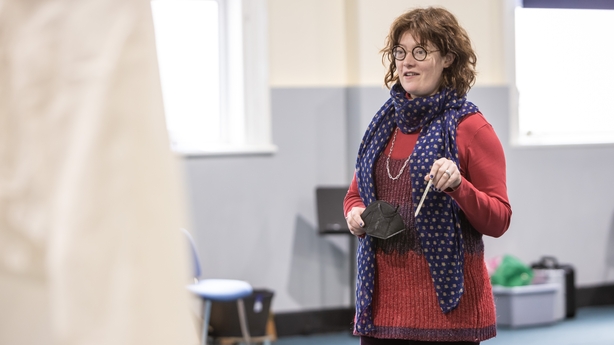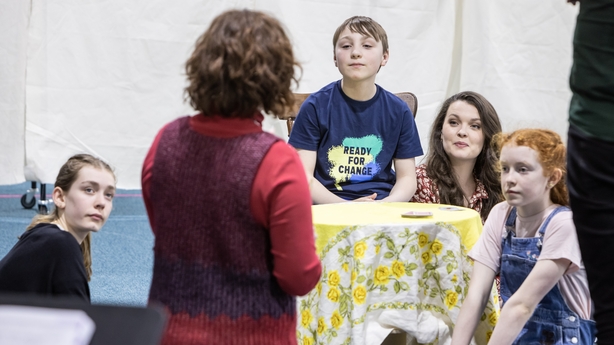Irish National Opera is taking to the road again, for an extended tour of one of French composer Jules Massenet's best-loved operas, Werther, a story based on Goethe's great novel of painful and destructive suppressed love. Director Sophie Motley introduces the new production, which relocates the time and place from late 18th-century Germany to a setting much closer to home...
Werther is a unique and beautiful opera, and each day I have the privilege to sit in rehearsal and let the romantic beauty of Massenet’s music flow over me as our arranger and répétiteur Richard Peirson plays the piano. I enjoy imagining how our chamber orchestra will relish the swells and silences of this story when we get to hear it on the stage.
As part of the journey, I’ve had the pleasure of meeting two groups of teenagers who will be responding to the opera before performances in Ennis and Cork. The story of Werther is very clear to them. The pain of unrequited love is well known to teenagers. It is something that they inherently understand. Along with the pain of being in love with your friend’s girlfriend. And also the fear that your partner can see that you are in love with someone else. Young people are anything but immune from the huge emotional ebbs and flows of depression associated with lost love.

Werther is an outsider. This is also something that our teenagers understand inherently. He does not fit in in his community. He is a loner. He doesn’t like to drink. He observes and reads and writes, and his artistic tendencies lead to him being ostracised from his rural community.
I grew up in a rural community, and the performance of masculinity expected from young men means that, even today, it is difficult for them to engage with their emotional or artistic sides. Suicide remains a heavy presence in contemporary rural Ireland. It is this which drew me to this work of Massenet and Goethe. Werther, like other young men unable to truly express themselves, ends up in a spiral of failing mental health where he sees no exit beyond taking his life.

Charlotte’s quandary is also sadly ever-present in rural communities. She marries out of duty, is never happy, lives in a space where her husband is often away, and writes letters to her former love. She ends up moving away from all her domestic duties, caring for her siblings, from her home to Albert’s silent and reflective home. She ends up in not one, but two toxic relationships.
Our production chooses to exacerbate this sense of loneliness and being an outsider. Set and costume designer Sarah Bacon, lighting designer Sarah Jane Shiels and myself have chosen to set the piece in rural Ireland. There’s a specific time where it fits well, the height of the Rural Electrification Scheme which had begun in 1946.
This was a time of great change, where many were left behind. Rural communities were abuzz with outsiders, the "Wire Men" who spent periods of time in villages, uncoiling electric cable, putting up electricity poles. Our Wire Men are Johann and Schmidt, and our ESB salesman, who travelled around the country selling electricity to these communities, is Albert.

Act II sees a great celebration, the great switching on of the electricity in our village, and the blessing of the electric kettles, ovens, and irons by the local priest. The electrification in our production only serves to sadden and alienate Charlotte even further. Electric machines are performing the domestic duties that once filled her days.
It is winter by Act III. Even her younger sister Sophie cannot bring Charlotte out of the melancholy she experiences, alone in her beautifully electric home, with Albert away.
It is only the return of Werther, and his existential, eventual doom, that brings her to the precipice of another choice – Werther and his death or Albert and a life devoid of love. Act IV then becomes one of the most lonely (and sadly frequent) places to die – between the barns in a deserted farmyard.
Our new adaptation of the score, fantastically arranged by Richard, is incredibly focussed and clear, and tells the story of these ill-fated lovers with alacrity, accessible for a smaller orchestra yet remaining true to Massenet’s intention. It brings a feeling of intimacy to this exciting and important opera.
INO's tour of Werther opens in Letterkenny at An Grianán on Saturday 22nd April and will be seen in Navan (Solstice Arts Centre, Tuesday 25th), Galway (Town Hall Theatre, Thursday 27th), Limerick (Lime Tree Theatre, Saturday 29th), Dundalk (An Táin, Tuesday 2nd May), Ennis (Glór, Thursday 4th May), Cork (The Everyman, Saturday 6th May), Waterford (Theatre Royal, Tuesday 9th) and Kilkenny (The Watergate Theatre, Thursday 11th) before ending in Dún Laoghaire (The Pavilion, Saturday 13th, Sunday 14th) - find out more here.
